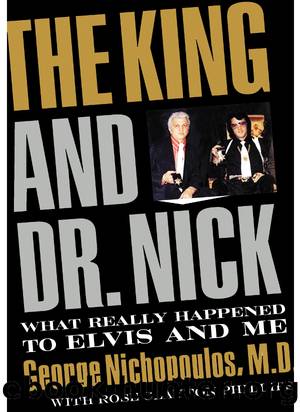The King and Dr. Nick: What Really Happened to Elvis and Me by George Nichopoulos & Rose Clayton Phillips

Author:George Nichopoulos & Rose Clayton Phillips
Language: eng
Format: epub
Publisher: Thomas Nelson
Published: 2018-08-02T00:00:00+00:00
FUELED WITHTHAT information, I obtained a copy of the Bio-Science Laboratory report and began my own search in earnest. The term polypharmacy intrigued me as a cause of death. Polypharmacy simply means âmore than one chemical.â I had been practicing polypharmacy for years; so had every doctor who prescribed more than one medication at a time to one person.
I had only read newspaper comments regarding Baptist Hospitalâs autopsy analysis, but it appeared to me that they had omitted a number of important factors from their equation when attempting to determine if Elvisâs death was drug-related. I believed the hospitalâs ruling had been premature, just as Dr. Franciscoâs provisional ruling had been. Baptistâs evidence was too clinically based to suit me. I felt a forensic-based analysis could yield different results. Sure, there were a lot of drugs in Elvisâs system, but were the levels deadly? No. Was there proof that in combination they had caused death? No.
Considering Elvisâs actions on the night he died, that he had conducted business meetings, played racquetball, and then read while attempting to go to sleep, overdose just did not seem possible. Still, if there was even a possibility that drugs killed Elvis, I, more than anyone else, wanted to know. There was a lot to consider:
⢠The idea that downers, even in high numbers, could have killed Elvis was laughable to me. Elvis was not even asleep when the sudden event struck that caused his death. How could the sedatives have killed him if they could not even put him to sleep?
⢠For the most part, except for the codeine, the medications in his body were ones he had been taking over a period of timeânothing exceptional. He had been taking the same medications every day and walking aroundâaliveâso that combination at those specific levels did not just happen to kill him on that particular day.
⢠The Demerol (meperidine) was only found by one laboratory, so it was undoubtedly a very small trace. I did not prescribe that Demerol to Elvis; he had been addicted to Demerol and detoxed from it. Contraband Demerol was found when he was hospitalized on April 1, 1977, and I still suspected it had led to his drug reaction in Palm Springs shortly after that. The Demerol could not have been influential in Elvisâs death; it had been in his body for too long.
⢠Elvis had not taken the Dilaudid I had prescribed for him the night he died. There had already been questions raised about the role of that drug in his death. The answer is simple: either Elvis never got the Dilaudid or he decided not to take it. Dilaudid was not in his blood, so it did not kill him. Some people claimed the Dilaudid was probably in his stomach contents that were not analyzed. That would not have mattered. If a substance is found only in the stomach, it cannot be the cause of death; it can only be a clue to the manner of death.
Download
This site does not store any files on its server. We only index and link to content provided by other sites. Please contact the content providers to delete copyright contents if any and email us, we'll remove relevant links or contents immediately.
Hit Refresh by Satya Nadella(9126)
When Breath Becomes Air by Paul Kalanithi(8427)
The Girl Without a Voice by Casey Watson(7885)
A Court of Wings and Ruin by Sarah J. Maas(7821)
Do No Harm Stories of Life, Death and Brain Surgery by Henry Marsh(6938)
Shoe Dog by Phil Knight(5257)
The Rules Do Not Apply by Ariel Levy(4957)
A Higher Loyalty: Truth, Lies, and Leadership by James Comey(4954)
Hunger by Roxane Gay(4922)
Tuesdays with Morrie by Mitch Albom(4770)
Everything Happens for a Reason by Kate Bowler(4734)
The Immortal Life of Henrietta Lacks by Rebecca Skloot(4579)
Millionaire: The Philanderer, Gambler, and Duelist Who Invented Modern Finance by Janet Gleeson(4468)
How to Change Your Mind by Michael Pollan(4355)
All Creatures Great and Small by James Herriot(4311)
The Money Culture by Michael Lewis(4198)
Man and His Symbols by Carl Gustav Jung(4131)
Elon Musk by Ashlee Vance(4121)
Tokyo Vice: An American Reporter on the Police Beat in Japan by Jake Adelstein(3983)
